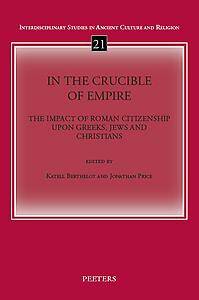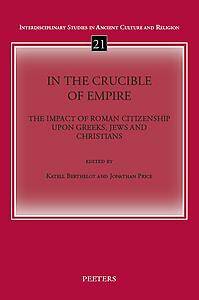
Je cadeautjes zeker op tijd in huis hebben voor de feestdagen? Kom langs in onze winkels en vind het perfecte geschenk!
- Afhalen na 1 uur in een winkel met voorraad
- Gratis thuislevering in België vanaf € 30
- Ruim aanbod met 7 miljoen producten
Je cadeautjes zeker op tijd in huis hebben voor de feestdagen? Kom langs in onze winkels en vind het perfecte geschenk!
- Afhalen na 1 uur in een winkel met voorraad
- Gratis thuislevering in België vanaf € 30
- Ruim aanbod met 7 miljoen producten
Zoeken
In the Crucible of Empire
The Impact of Roman Citizenship Upon Greeks, Jews and Christians
€ 161,45
+ 322 punten
Omschrijving
This volume examines the dynamic concept and changing reality of Roman citizenship from the perspective of the provinces in Rome's vast, multi-ethnic empire, both before and after Caracalla's grant of universal citizenship in 212 CE. In Greek communities, and in Jewish and Christian conceptual and actual constructed communities, the Roman definition of citizenship had a profound impact on the shape of abstract ideas of community, discourse about communal membership and peoplehood, and legal and civic models. Just as Roman citizenship was forever redefining its restrictions and becoming ever-more inclusive, so the borders of the other communities to which Greeks, Christians and Jews claimed "citizenship" were also flexible, adaptable, dynamic.
Specificaties
Betrokkenen
- Uitgeverij:
Inhoud
- Aantal bladzijden:
- 345
- Taal:
- Engels
- Reeks:
- Reeksnummer:
- nr. 21
Eigenschappen
- Productcode (EAN):
- 9789042936683
- Verschijningsdatum:
- 20/04/2019
- Uitvoering:
- Paperback
- Formaat:
- Trade paperback (VS)
- Afmetingen:
- 160 mm x 239 mm
- Gewicht:
- 566 g

Alleen bij Standaard Boekhandel
+ 322 punten op je klantenkaart van Standaard Boekhandel
Beoordelingen
We publiceren alleen reviews die voldoen aan de voorwaarden voor reviews. Bekijk onze voorwaarden voor reviews.








